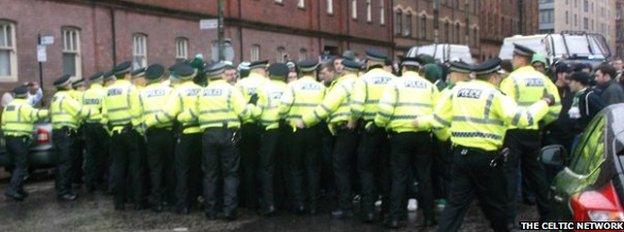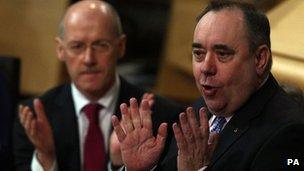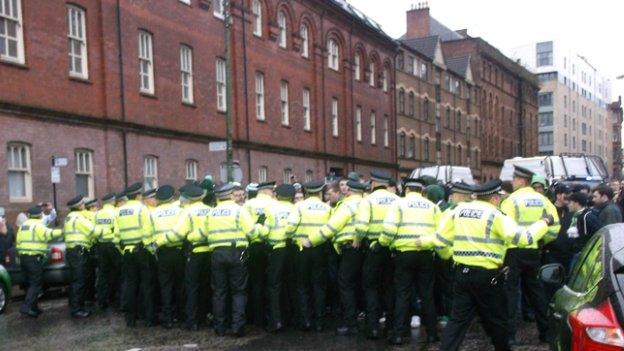Holyrood working well
- Published

A member of the Iraqi Civil Defense Corps patrols the country 10 years on from war
Remarkable parliamentary exchanges at Holyrood today - with some of the credit due to innovations introduced by the Presiding Officer, Tricia Marwick.
She it was who backed the use of Topical Questions to Ministers in an effort to ensure that Holyrood keeps pace with events.
Today, it worked. There were intriguing discussions anent Leveson - with, it would appear, an emerging deal with regard to the implementation of Press regulation in Scotland.
In the by-going, the Culture Secretary Fiona Hyslop was warm in her comments towards Lord Leveson's UK report, warm in her endorsement of the need for consensus - and notably cool towards the Scottish proposals advanced by Lord McCluskey's expert panel which advocated compulsion and the inclusion of online posts.
On McCluskey, she described the report as "clearly drafted" and "interesting". If the minister will permit me, I would translate that as: "Thanks - but no thanks".
So where next? I understand that the Education and Culture Committee at Holyrood plans a very brief inquiry into the implications of the proposals which have now emerged at Westminster for a Royal Charter.
Specifically, they will ask - as will the Scottish government - how such a charter could be made to tally with Scots Law which, for example, differs from the situation south of the Border by making no provision for exemplary damages.

More than 200 officers were sent to police the Green Brigade protest
Simultaneously, Ms Hyslop will pursue cross-party talks, discussions with newspapers - and, perhaps above all, discussions with the UK government, as agreed between the Prime Minister and First Minister.
The likely outcome? A Royal Charter, as outlined at Westminster, but with a method of Scottish validation, if such can be designed.
Topical Question number two also provoked controversy. It concerned the demonstration by the Green Brigade of Celtic fans on Saturday in protest at what they see as the inappropriate implementation by the police of the act designed to target sectarianism in connection with football.
Labour's Michael McMahon said MSPs should view the events at the weekend with "shock and alarm".
He said the act appeared to many to be counter-productive, causing trouble which it was designed to forestall. His colleague Hugh Henry said there was now a danger that both Celtic and Rangers fans would lose confidence in the police.
But the Justice Secretary Kenny MacAskill gave little ground. The demo on Saturday, he said, had not adhered to the requirement to provide prior notice to the local council - and had therefore not obtained consent. People were entitled to demonstrate - but not illegally.
Oratory and passion
Mr MacAskill pointed out that the arrests made on Saturday were in connection with other matters such as alleged breach of the peace - not issues arising from the Offensive Behaviour act which was the core of the controversy. He insisted the act was working well.
And then to the main debate which, instead of dealing with contemporary events, was quite deliberately pitched at an anniversary. Ten years since the invasion of Iraq.
In advance, Labour had sought to prevent the debate, arguing that it did not lie within the competence of the Scottish Parliament and that time would be better spent on topics such as the economy or public spending.

Alex Salmond said the war was "based on a fraud and deception"
But, mirroring the comparable debate ten years ago, this produced high standard oratory, thoughtful contributions and, above all, passion. The First Minister Alex Salmond combined all three in his speech.
Tony Blair's decision to go to war, he said, had been "based on a fraud and deception" in the shape of manipulated intelligence. He said Labour should now "find the integrity" to admit the conflict had been a mistake.
Labour's Johann Lamont was called to speak fourth. That is because her party did not table any amendments - and indeed declared the intention to abstain in all votes. She said she would have preferred a debate without a formal motion.
In her contribution, she argued that the issue was divisive - but that it was valid to come down, on balance, in favour of an intervention which had ended the evil regime of Saddam Hussein. She said that, for her, it was never about Weapons of Mass Destruction, the justification advanced by Tony Blair.
For the Conservatives, John Lamont said the invasion had "brought one of the world's greatest war criminals to justice".
Willie Rennie for the Liberal Democrats took a different view. The war, he said, was "illegal, costly, bloody, just plain wrong."
- Published19 March 2013

- Published18 March 2013
